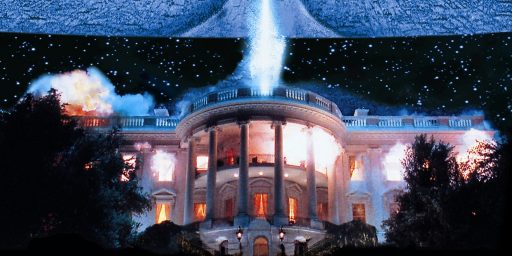Do Earthquakes Stimulate the Economy?
Either a bunch of bloggers or one of the world's smartest economists doesn't understand economics.
A parody Google+ page under the name of Nobel Prize-winning economist Paul Krugman declares, “People on twitter might be joking, but in all seriousness, we would see a bigger boost in spending and hence economic growth if the earthquake had done more damage.”
People with a passing familiarity with economics will immediately recognize Frederic Bastiat’s fallacy of the broken window, articulated in 1850:
Have you ever witnessed the anger of the good shopkeeper, James B., when his careless son happened to break a square of glass? If you have been present at such a scene, you will most assuredly bear witness to the fact, that every one of the spectators, were there even thirty of them, by common consent apparently, offered the unfortunate owner this invariable consolation – “It is an ill wind that blows nobody good. Everybody must live, and what would become of the glaziers if panes of glass were never broken?”
Now, this form of condolence contains an entire theory, which it will be well to show up in this simple case, seeing that it is precisely the same as that which, unhappily, regulates the greater part of our economical institutions.
Suppose it cost six francs to repair the damage, and you say that the accident brings six francs to the glazier’s trade – that it encourages that trade to the amount of six francs – I grant it; I have not a word to say against it; you reason justly. The glazier comes, performs his task, receives his six francs, rubs his hands, and, in his heart, blesses the careless child. All this is that which is seen.
But if, on the other hand, you come to the conclusion, as is too often the case, that it is a good thing to break windows, that it causes money to circulate, and that the encouragement of industry in general will be the result of it, you will oblige me to call out, “Stop there! your theory is confined to that which is seen; it takes no account of that which is not seen.”
It is not seen that as our shopkeeper has spent six francs upon one thing, he cannot spend them upon another. It is not seen that if he had not had a window to replace, he would, perhaps, have replaced his old shoes, or added another book to his library. In short, he would have employed his six francs in some way, which this accident has prevented.
Let us take a view of industry in general, as affected by this circumstance. The window being broken, the glazier’s trade is encouraged to the amount of six francs; this is that which is seen. If the window had not been broken, the shoemaker’s trade (or some other) would have been encouraged to the amount of six francs; this is that which is not seen.
And if that which is not seen is taken into consideration, because it is a negative fact, as well as that which is seen, because it is a positive fact, it will be understood that neither industry in general, nor the sum total of national labour, is affected, whether windows are broken or not.
Now let us consider James B. himself. In the former supposition, that of the window being broken, he spends six francs, and has neither more nor less than he had before, the enjoyment of a window.
In the second, where we suppose the window not to have been broken, he would have spent six francs on shoes, and would have had at the same time the enjoyment of a pair of shoes and of a window.
Now, as James B. forms a part of society, we must come to the conclusion, that, taking it altogether, and making an estimate of its enjoyments and its labours, it has lost the value of the broken window.
When we arrive at this unexpected conclusion: “Society loses the value of things which are uselessly destroyed;” and we must assent to a maxim which will make the hair of protectionists stand on end – To break, to spoil, to waste, is not to encourage national labour; or, more briefly, “destruction is not profit.”
What will you say, Monsieur Industriel — what will you say, disciples of good M. F. Chamans, who has calculated with so much precision how much trade would gain by the burning of Paris, from the number of houses it would be necessary to rebuild?
I am sorry to disturb these ingenious calculations, as far as their spirit has been introduced into our legislation; but I beg him to begin them again, by taking into the account that which is not seen, and placing it alongside of that which is seen. The reader must take care to remember that there are not two persons only, but three concerned in the little scene which I have submitted to his attention. One of them, James B., represents the consumer, reduced, by an act of destruction, to one enjoyment instead of two. Another under the title of the glazier, shows us the producer, whose trade is encouraged by the accident. The third is the shoemaker (or some other tradesman), whose labour suffers proportionably by the same cause. It is this third person who is always kept in the shade, and who, personating that which is not seen, is a necessary element of the problem. It is he who shows us how absurd it is to think we see a profit in an act of destruction. It is he who will soon teach us that it is not less absurd to see a profit in a restriction, which is, after all, nothing else than a partial destruction. Therefore, if you will only go to the root of all the arguments which are adduced in its favour, all you will find will be the paraphrase of this vulgar saying – What would become of the glaziers, if nobody ever broke windows?
Emphases mine in all cases.
I’m rather confident that Krugman, who has his PhD in economics from MIT and has won a half dozen international prizes for his contributions to macroeconomic theory, including the John Bates Clark Medal and the aforementioned Nobel, is aware of Bastiat’s work. But the parody account holder’s point is that he operates as if he doesn’t. Indeed, as AllahPundit points out, Krugman made an almost identical argument three days after the 9/11 attacks.
Presumably, Krugman’s response would be that macroeconomics is different than microeconomics and public spending is different than private spending. As Matt Yglesias pointed out in a different context last week:
When Bastiat wrote that, “money” meant, in France, a commodity of which there was limited supply. Specifically, the so-called “Germinal Franc” contained 290.32 mg of gold. The modern economy isn’t like that. The quantity of money and credit are policy variables. If the country were afflicted with unemployed glaziers, Ben Bernanke could run around smashing bakery windows and leaving checks behind. The checks don’t need to be backed by anything, and the bakers will use the checks to hire glaziers to replace the lost windows without reducing their spending on tailors. Problem solved. This would be, admittedly, a silly way to resolve the problem. A more reasonable approach would be to cut the checks and pay the glaziers to do something useful. But it would work. Everyone understands that we don’t have a barter economy operating or a gold standard operating purely with cash-in-advance, but people often fail to see that this is important. But it makes a ton of difference. Among other things it means that if your argument about why something can’t be done turns at some key point on an alleged scarcity of money that something has gone awry.
So, yes, if major damage had been done to the infrastructure of the national capitol region, the Federal government could simply borrow money and pay to fix it without forgoing spending it was otherwise going to make. Politically, of course, that’s not going to happen in the current climate, in which simply raising the nation’s self-imposed borrowing limit to pay for spending already agreed to is cause for a standoff. But, if Krugman were king, we could fix the broken windows and still buy all the shoes we would have.
Indeed, that’s been US national policy for going on four decades now, in good times and bad. Our solution to the age-old guns versus better dilemma was ingenious: Both!
The fine print, unfortunately, that someone ultimately has to pay for it. We’re already at the point where just the interest on the national debt is more than we spend on virtually every non-defense discretionary category.
Additionally, given that the federal budget is $3.46 trillion and the annual GDP is $14.12 trillion, the earthquake would have had to be epic, indeed, for the repair bills to have provided much of a stimulus.
UPDATE (Alex Knapp): Krugman never said this – that Google Plus account isn’t his.
UPDATE (James Joyner): Alex beat me to the update. As “Carlos,” the person who professes to be behind the account, he did so to illustrate Krugman’s actual views. He collects several examples, in addition to the post-9/11 one noted in my original post. I’ve changed the post title and made minor changes to the original post to avoid perpetuating the false rumor that Krugman actually wrote the post in question. The analysis itself remains unchanged.







Krugman did not violate the BWF because he did not promise a net increase in GDP, or net growth. He only promised a blip, which may imply a reduction later.
(The BWF is a simple thing that, perhaps because it is so well known to the general public, is very much … proudly over-applied.)
Oh, good grief: I mention FrankJ of IMAO in another thread, and then I see he’s put up some one-liners on this very topic:
If there’s a bomb threat at the NYT headquarters, don’t worry; that’s Krugman trying to help them out financially.
Actually, Krugman would make a great Bond villain. “I’m just trying to help the world’s finances… one mushroom cloud at a time!”
Giving the Nobel Prize in Economics to Paul Krugman is starting to seem like the equivalent of giving the Nobel Peace Prize to Arafat.
Now it makes sense that Krugman sent something labeled “My economic plan” to Obama and it was the first season of The Walking Dead.
So NYT editorial staff: Guy in love with Chinese dictatorship, economist who doesn’t understand the broken window fallacy, and… Dowd.
FrankJ, folks. Of imao.us fame.
J.
The point of the BWF is not that statements like Krugman’s are false. The point is that it is dangerously absurd to take any comfort in such statements, as they are meaningless when properly analyzed.
All this produces is churning and justification to forcibly redistributed wealth. Churning, as your stockbroker can show you, is good for moving money from those that have it to those that want it. Whether it be from insurance company investments to construction workers or from taxpayers in undamaged parts of the country to the disaster area.
Here is Milton Friedman explaining the fallacy of spending
Take his a advice and explore the extreme case. If a moderate amount of earthquake damage is good, then total devastation of DC and the East Coast would be wonderful for stimulus. Throw in a follow-on hurricane and now you’re getting somewhere. But if you looked at that extreme case, you see it is nonsense. A devastated East Coast would be a drain on the economy for decades, benefits of a thousands of out of work regulators not withstanding. We have a real-world case, how’s Japan doing in the economic growth these days?
@JKB: Unfortunately for you JKB, Friedman ia describing a system which ceased to exist in 1971 when Nixon closed the told window. Continuing to think in terms of the gold standard is a major part of the reason we’re in the current economic mess.
Which demonstrates only that taking things to extremes is nonsensical. Any situation that has multiple factors will always degrade when one factor is pushed to an extreme, thus ignoring the other factors.
Any Keynesian would agree with the Broken Windows Fallacy if there are not substantial unused capacity in the economy that is unused because of a Minsky risk -reevaluation and flight to safety. That is 90% of the time.
However we are in the other 10% of the scenarios where spending cash to replace damaged/destroyed capital goods is expansionary because there are massive amounts of under-used economic resources (workers, capital, industrial capacity etc).
@john personna:
This.
@James Joyner,
I assume Krugman is implying the additional spending would be positive during a recession, but he’s made statements before indicating he does not, in fact, understand Modern Monetary Theory.
Paying off our debt is not an issue. The United States does not, in fact, actually “owe” anyone anything other than green slips of paper. We’re effectively doing the average bondholder a favor by issuing debt for him to purchase because we don’t really need his money at all. What is an issue is managing spending so as to avoid deflation or significant inflation. While Krugman gets that deficit spending when the economy is below capacity is a good thing because it adds net financial assets to the private sector, he doesn’t seem to understand that doing so in good times can destabilize the money supply and create financial havoc.
Apparently that google+ account is a fake account.
http://campaignfix.com/2011/08/24/paul-krugmans-google-account-is-fake-i-know-because-i-created-it/
@Ben Wolf:
You know that’s not true. A reminder, from 2005:
A government’s ability to borrow, and at what rate, is linked to a number of things, but inflation expectation is near the top of the list.
You seem to be playing a stupid game, that is “since inflation fear is currently low, it will always be low, no matter how many “green slips of paper’ we print.”
@Matt:
Interesting, but as that page reminds us, Krugman has made other statements which dodge the BWF by being more narrowly true. They are either about short term gains, or about special liquidity trap economics.
Yet you utterly failed to notice I wrote this:
Your reading comprehension is what is at question. Bondholders are irrelevant to an autonomous currency issuer with a flexible system of exchange. The issue (as I stated) is inflation, and government has the tools to control it while retiring “debt” if it so chooses. Get your head out of the 18th century.
It appears to be fake: http://krugman.blogs.nytimes.com/2011/08/24/identity-theft/
@Ben Wolf:
If you acknowledge that there are limits to debt and limits to printing ‘green slips of paper’ then I might agree, but I don’t think that’s what you’ve been arguing in recent days.
And probably the fact that you endorsed debt jubilee in the other thread makes me think that you are a complete madman.
@john personna:
They work, and we have considerable historical evidence of this. I endorse doing what works, not what some “theory” says we should do in a given situation. We are not in a typical economic downturn resulting from the business cycle. We’re in a balance sheet recession, and until that private debt it is retired the economy cannot recover. If benefitting 300,000,000 means a few hundred thousand creditors lose, so be it. A modern economy cannot function when it is run for the few.
@Ben Wolf:
So explain the mechanics to me. Say I have money at my local FDIC insured credit union, and they in turn have my money out as consumer loans. Let’s say they are prudent consumer loans.
What would “jubilee” mean in 2011? The credit union eats it, defaults, and is taken over by the FDIC?
Or do you want my savings account forfeit?
There are no limits to debt for the federal government. Debt is not even relevant to the discussion, because the only reason the feds issue debt is to hit a target overnight rate, not to acquire funds to spend.
The limiting factor is currency value, and how much of it is flowing through the system. Taxing and spending are not issues of budget-keeping, they are methods of controlling inflation and deflation, and of creating an appropriate level of expansion in the money supply to facilitate economic growth.
Currency (i.e. money) is not wealth. It is not backed by a bit of precious metal to give it an abitrary value. “Wealth” is roads, canals, intellectual property, farms, inventory and productivity. “Money” is nothing more than a token. You sometimes get tokens at amusement parks for certain types of exchange. This is the same role money plays in the modern economy, as a token for economic exchange. The Federal government’s role is to ensure a sufficient number of tokens are in play at any time so the the private sector can grow, without putting in so many tokens they create negative economic effects. What you aren’t taking into consideration is that while the government can create inflation by creating too much money and spending it into the economy, so it can also create disinflation by taking money back out of the economy and destroying it.
I don’t advocate unlimited spending as you imply; in fact there is no set policy the government should embrace regarding the federal budget. What government does should look more like a balancing act, constantly adjusting its policies to achieve the desired economic result. If we decide to retire the debt, then other policies (such as higher taxes) will have to be implemented to pull excess reserves out of the economy and prevent inflation.
@Ben Wolf:
There is a contradiction between:
and:
You are asserting that government can borrow as much value as it needs, in currency that it may destroy at will.
@Ben Wolf:
You seem to be under the delusion that money or even gold is wealth. They are measures of wealth and in an operating society they can facilitate trade. However, when resources, things people need, are scarce, both are worthless. You can have all the money or gold in the world but if food is scarce, you’ll go hungry unless someone feels they have a surplus of food that they can survive without. Regardless of gold discovered or money printed, the resources for which they facilitate the trade are limited.
Resources expended to rebuild are resources not available for new productive enterprise. The caveat is that a disaster may wipe away old low-productive businesses and infrastructure and have it replaced by others. Still this is simply a transfer of wealth as even if the businesses and infrastructure remains in the same ownership, those owners will now have debt to repay and a “forced” investment of their own wealth in the form of both time and money.
@john personna:
You see, John, in Ben’s world, only the politicians and bureaucrats have free will, everyone else must just accept what they do. This is why he can’t comprehend that while Obama and his minions are running about sewing FUD and changing regulations on whim, that citizens aren’t just hiring, spending and doing as they are told.
You’ve all missed the point. Without the stimulus of 100% of the population on food stamps and an alien invasion, a simple earthquake is “simply not a big enough stimulus.”
@JKB:
JKB, don’t you get it? Business, like the Stepford Wives, is supposed to be selfless, put their own interests aside for their leaders, otherwise they are considered selfish, greedy fat cats just sitting on piles of money.
Doh…Jan’s off the meds again.
Even though the Google Plus account is not Paul Krugman’s, the comment rendered in it could very well have come from his mindset.
Here is an opinion piece written by Krugman, saying basically the same thing, except this was in reference to Japan’s problems.
Maybe it was from this very column that the poser got his inspiration.
@jan:
In the narrow context of a liquidity trap, and a global savings glut, short-term stimulus can result from disaster spending. It is a special case where the opportunity cost is low.
(Or put another way, do you really think it’s better that so many trillions sit in treasuries at near-zero interest rates?)
@john personna:
An effectve debt jubilee would see the Treasury take ownership of non-performing debts (things like underwater mortgages) at their true value; not the bullshit valuations we get now thanks to the free pass banks have been given on mark-to-market. The Treasury or whatever office it creates would preferably write the loan down to a level which the borrower can afford to meet. It can also easily grant deferments of payment for those currently unemployed as there is no short-term profitability target to meet. The additional money injected into the system would have the benefit of being repaid right back to the feds, nullifying inflationary pressures.
For a credit union this would create no ill effects, and in the case of a for-profit bank they are recapitalized at the true market value of the non-performing loans. Will they take a loss? Of course, but it’s a loss they’ve earned, and in any case irrelevant to future (and hopefully wiser) lending. Bailing out debtors is far more stimulative to the economy than bailing our banks and bondholders.
When did I say this?
@Ben Wolf:
I think you just backtracked with a crazy definition of jubilee.
In the other thread you said:
Why do I even respond to you …
(I used to think Ben was just the anti-Drew, with an equivalent level of left-wing crazy. Now I think that was an insult to Drew.)
@john personna:
Ultimately the government does not need to borrow anything. It isn’t revenue constrained the way you and I are. Issuing debt is basically an artifact of an economy where the government’s supply of gold was limited, so to spend more it had to get more gold. It isn’t even really accurate to say the government has any money; any government contractor can tell you when the feds wants to hire them for something it just credits their account. Boom, money created and net financial assets transferred to the private sector. The government has the ability to create any number of tokens it requires, the only real constraint is inflation which is potentially injurious to the economy.
Uncle Sam’s economic job is simply to manage the supply and demand for its currency to retain sufficient value and public faith in the instrument. Depending on the state of the economy that involves either spending or saving.
@john personna: That’s your mistake: I’m neither left-wing nor right-wing, and quite frankly issuing a stream of insults as you have in this thread exposes the weakness of your arguments. You have an ideology, I don’t.
@Ben Wolf:
I think you rather missed the focus of my comment.